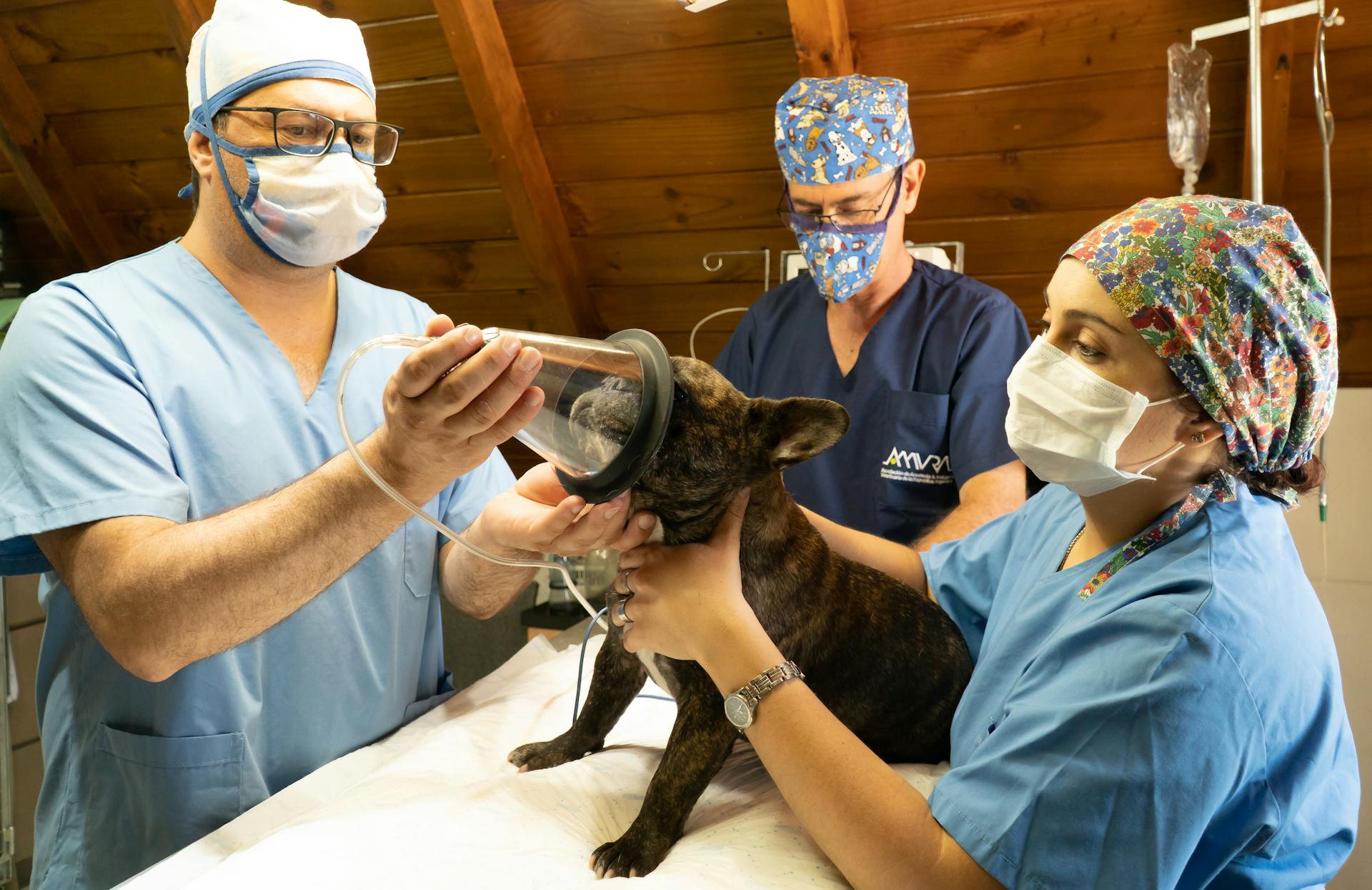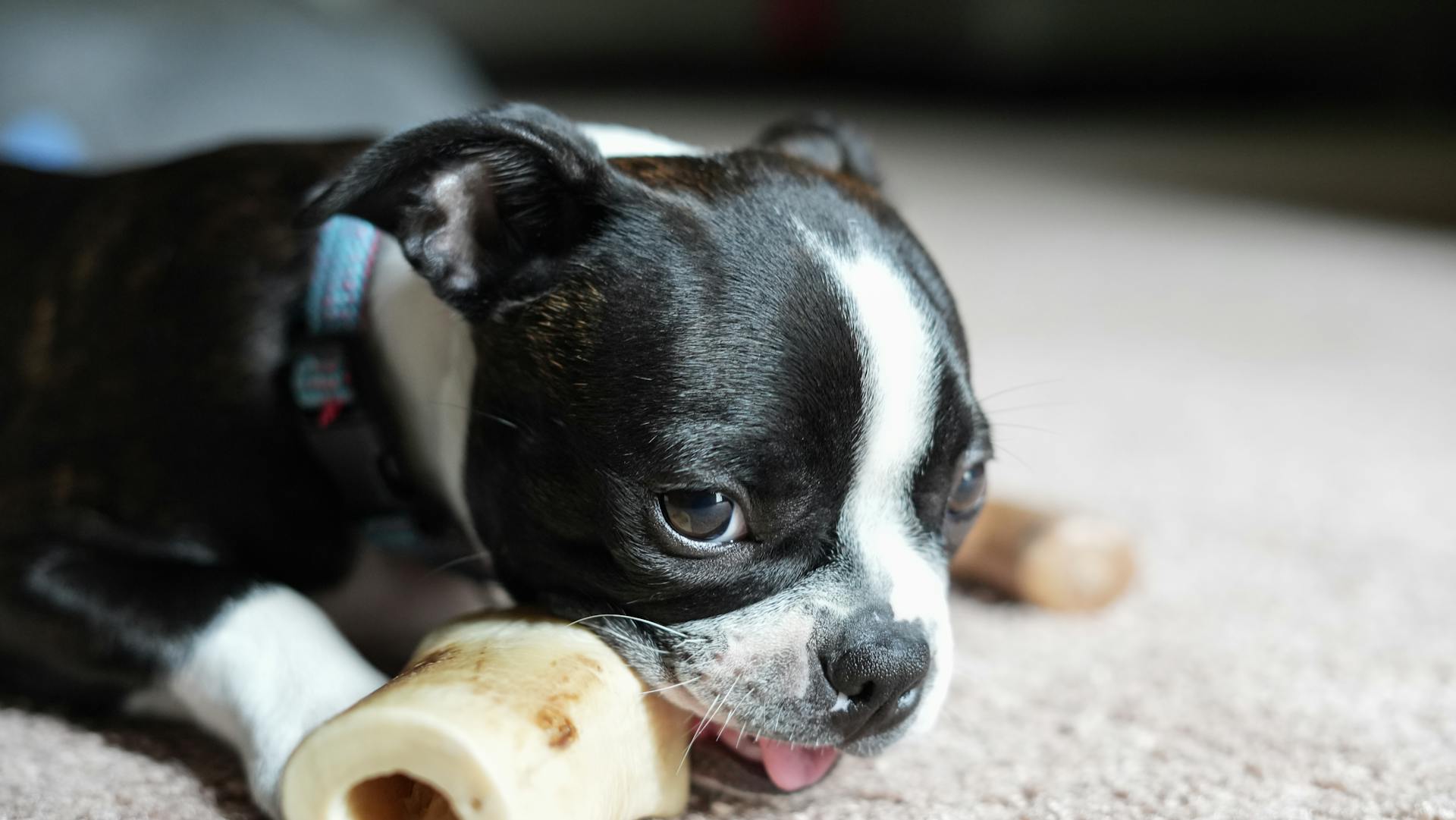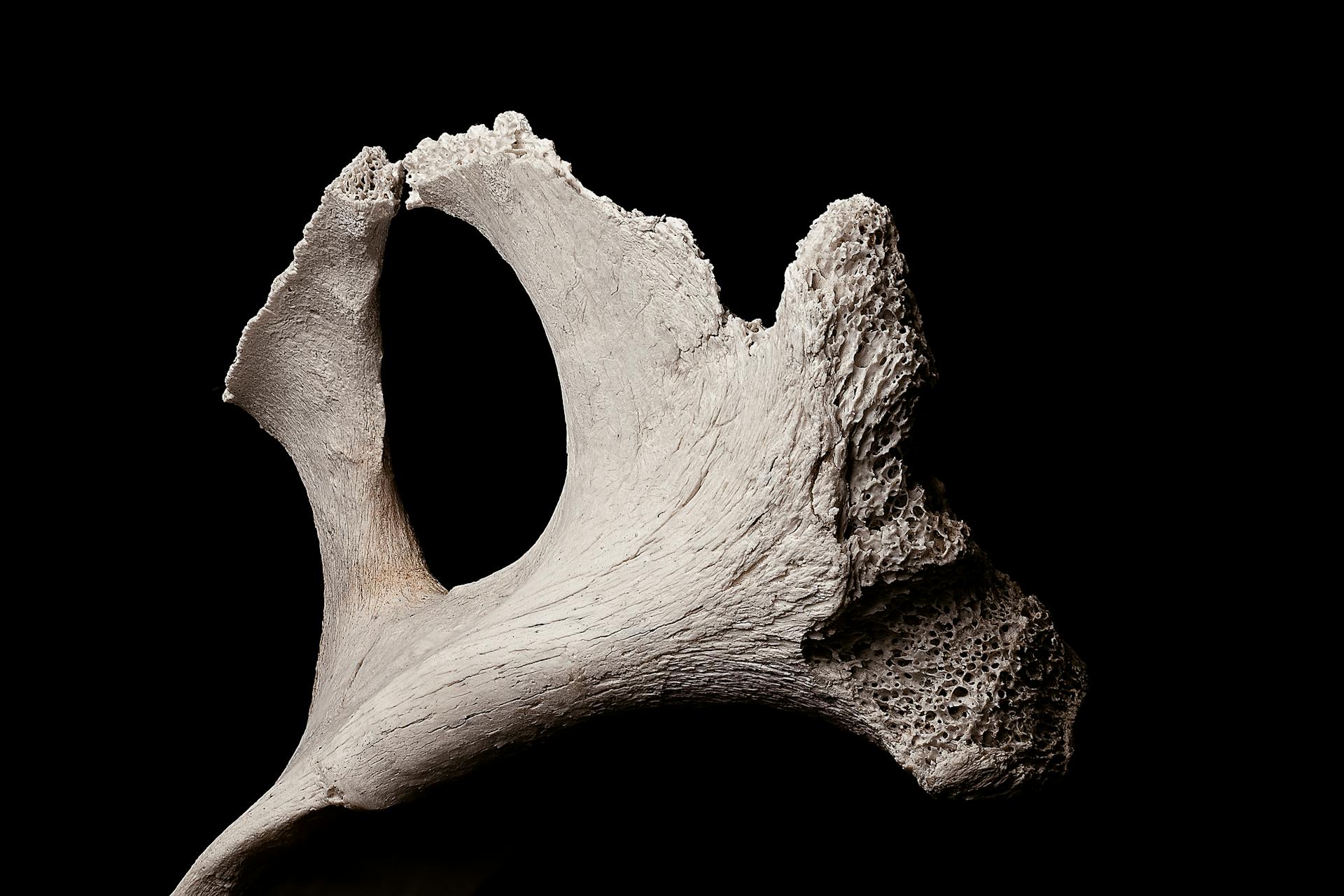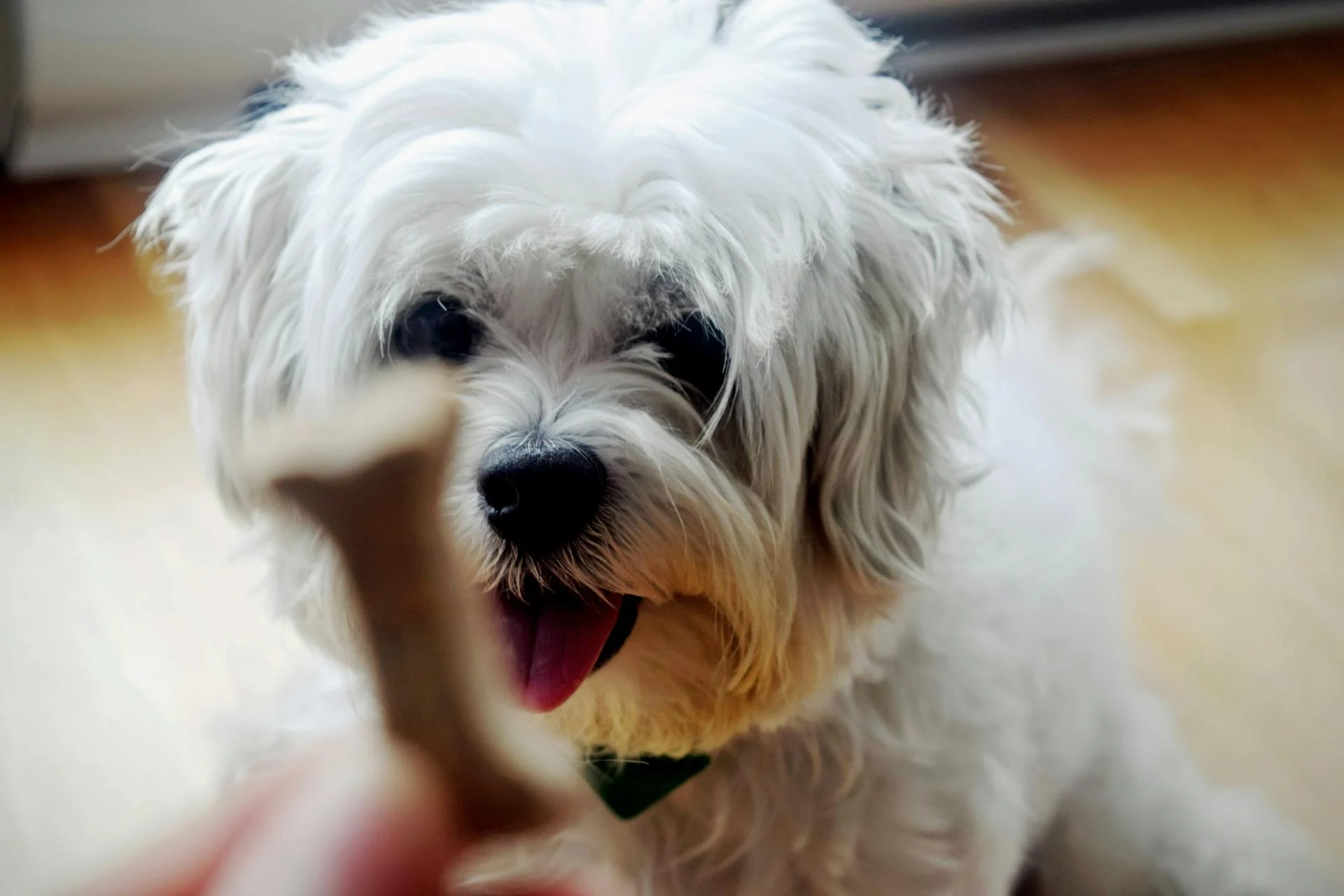
Dogs eating pork rib bones can be a real concern, especially if you're a pork lover like me. Pork rib bones are a common culprit behind gastrointestinal issues in dogs.
Dogs can choke on pork rib bones, which can lead to serious health complications. This can happen if the bone gets stuck in the dog's throat or digestive tract.
Pork rib bones can cause intestinal blockages if they get stuck in the dog's intestines. This is a life-threatening condition that requires immediate veterinary attention.
If you're a dog owner, it's essential to take precautions to prevent your furry friend from getting into pork rib bones.
Check this out: Dogs Eat Pork
Can Dogs Eat Pork Rib Bones?
Feeding raw pork rib bones to dogs is not recommended due to the choking hazard they pose.
Raw bones can splinter and cause internal punctures or blockages in dogs.
You should consult with your veterinarian before considering feeding raw pork rib bones to your dog.
They can provide guidance based on your dog's size, breed, overall health, and dietary needs.
Raw pork rib bones can carry bacteria like Salmonella, which can pose health risks to both dogs and humans in the household.
Risks and Dangers
Dogs eating pork rib bones can pose significant health risks, including choking hazards, splintering, digestive blockages, dental problems, and nutritional imbalances.
Choking is a major concern, as rib bones can easily get stuck in a dog's throat, causing gagging and potentially life-threatening situations. Splintering is another risk, as cooked bones can crack and break into sharp pieces that can cause internal injuries.
Cooked bones are more likely to splinter than raw bones, but it's not impossible for raw bones to crack and splinter too. This can lead to lacerations in a dog's mouth, oesophagus, stomach, and intestines, resulting in internal bleeding and infections.
Here are some potential dangers associated with dogs eating pork rib bones:
- Choking Hazard: Rib bones are typically small and can be easily choked on.
- Splintering: Cooked bones can splinter and break into sharp pieces.
- Digestive Blockages: Larger pieces of bone can become lodged in the intestines.
- Dental Problems: Chewing on hard bones can break a dog's teeth or damage the gums.
- Nutritional Imbalance: Relying on bones as a treat or supplement can lead to nutritional imbalances.
Additionally, raw pork rib bones can carry bacteria such as salmonella, campylobacter, and E. coli, which can cause serious infections in dogs. Pancreatitis is also a risk, especially if a dog consumes a high amount of fat from the bone marrow.
Broken Teeth
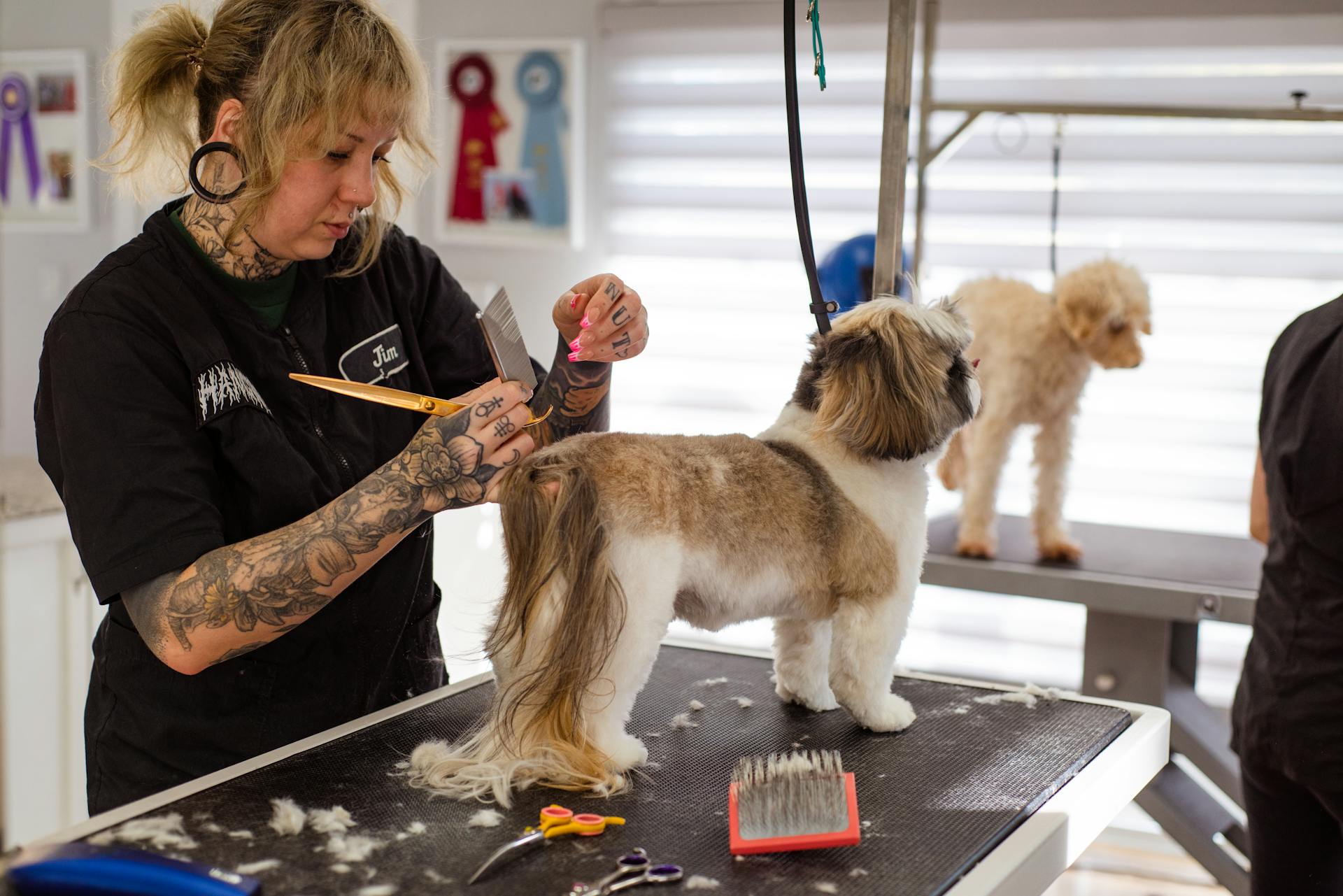
Broken teeth can be a painful and costly issue for your furry friend. Dr. Wigfall warns that the hard exterior of animal bones can cause your dog's teeth to break, leaving them exposed to infections.
Chewing on hard bones can be a common cause of broken teeth. The hard surface of bones can crack or shatter your dog's teeth, leading to painful dental problems.
If your dog breaks a tooth, it may require advanced dental work or even surgical extraction to fix. This can be a costly and stressful process for both you and your dog.
Here are some potential risks associated with broken teeth:
- Chewing on hard bones can cause dental problems, including broken teeth and gum damage.
- Broken teeth can lead to infections, which can be painful and potentially life-threatening if left untreated.
- Surgical extraction may be necessary to repair or remove broken teeth.
Risks and Dangers
Feeding your dog rib bones can be a recipe for disaster. Cooked bones can splinter easily when chewed on, causing lacerations in your dog's mouth, oesophagus, stomach, and intestines.
These splintered bones can also perforate or injure your dog's gastrointestinal tract, leading to stomach infections. Cooked rib bones are particularly prone to splintering, causing immediate injury in your dog's tummy.
Expand your knowledge: Cancer-causing Dog Food Brands
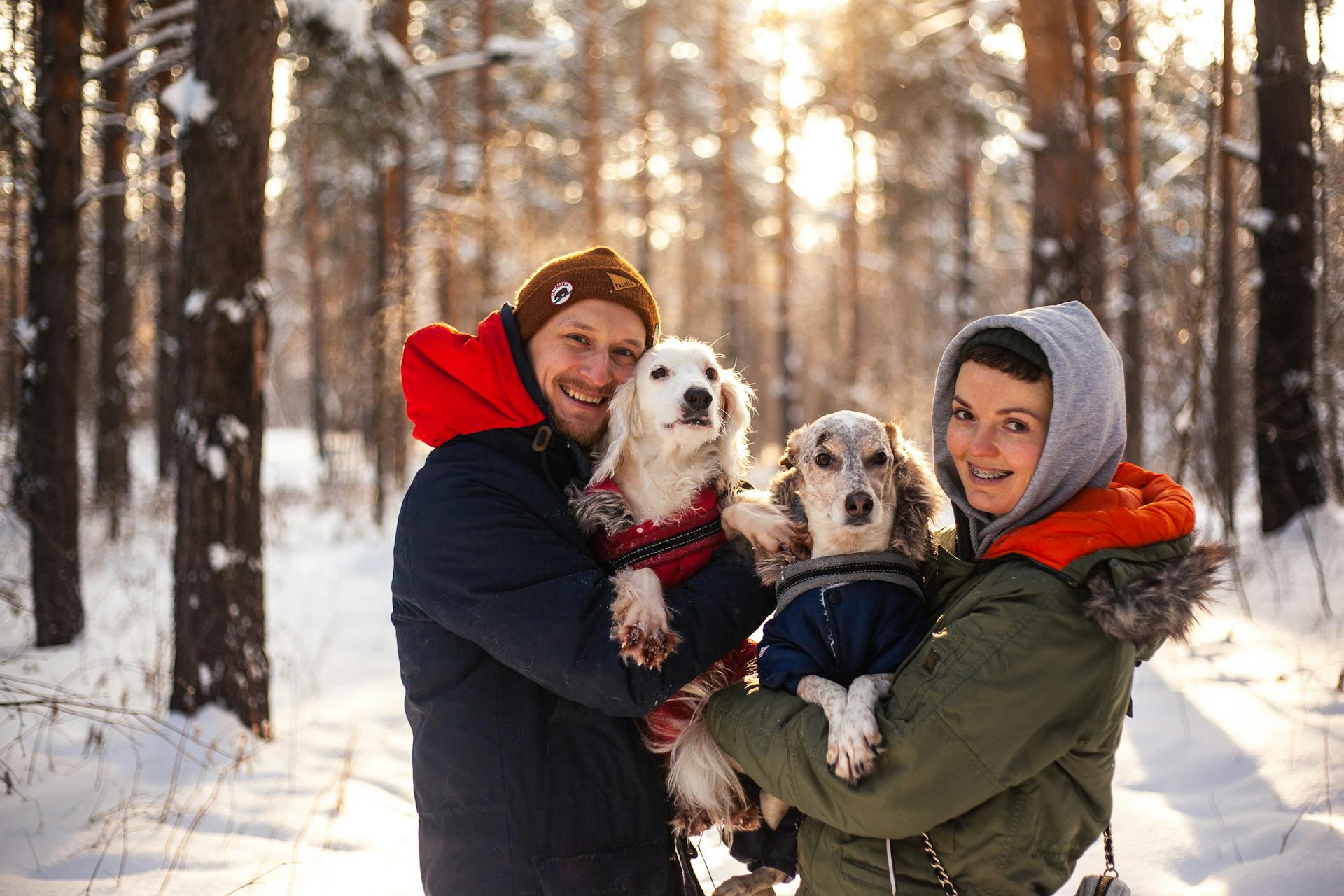
Choking is another significant risk associated with feeding your dog rib bones. Even if your dog doesn't swallow the bone whole, shards can become lodged in the esophagus, causing gagging and discomfort.
Dental problems are also a concern when your dog chews on hard bones. Chewing on rib bones can break a dog's teeth or damage the gums, leading to painful and potentially costly veterinary treatment.
Here are some of the potential dangers associated with feeding your dog rib bones:
- Choking Hazard: Rib bones are small and can be easily choked on, especially by larger dogs.
- Splintering: Cooked bones can splinter and break into sharp pieces, causing internal injuries.
- Digestive Blockages: Larger pieces of bone can become lodged in the intestines, leading to blockages that may require surgery.
- Dental Problems: Chewing on hard bones can break a dog's teeth or damage the gums.
- Nutritional Imbalance: Relying on bones as a treat or supplement can lead to nutritional imbalances if not properly balanced with other foods.
Raw bones may also carry bacteria such as salmonella, campylobacter, and E. coli, which can cause serious infections in dogs. Pancreatitis, a potentially life-threatening condition, can also be triggered by eating pork rib bones due to their high fat content.
Symptoms and Treatment
If your dog has eaten pork rib bones, it's essential to be aware of the potential symptoms that may arise. Diarrhea is a common issue, as the preservatives used to process the bones can cause an allergy, while the bones themselves can block the gastrointestinal tract.
If your dog is experiencing diarrhea, give him dog-friendly probiotics to balance the bacteria in his tummy and aid in digestion. A bland diet is also crucial to help him recover.
In addition to diarrhea, look out for other symptoms such as vomiting, loss of energy, and refusal to eat. These can be signs that the gastrointestinal tract has been affected by the rib bones.
If your dog throws up after eating rib bones, it's crucial to bring him to the vet right away. Vomiting can escalate to choking, and a vet can provide the necessary treatment to prevent further harm.
Here are some key symptoms to watch out for:
- Gagging or choking
- Loss of appetite
- Vomiting
- Constipation
- Diarrhea
- Lethargy
- Inability to sit comfortably
- Restlessness
If your dog is vomiting bone fragments, it's a clear sign that he needs to see a vet. The vet can check for any remaining bone fragments that may be lodged in his tummy or intestine and cause further harm.
In any case, if you suspect that your dog has eaten pork rib bones, monitor him closely for signs of discomfort and lethargy. These symptoms can indicate that his tummy is in shambles, and prompt veterinary attention is necessary to prevent further complications.
Check this out: Dog with Bone in Mouth
What to Do
If you suspect your dog has ingested a pork rib bone, it's crucial to act quickly.
Seek veterinary attention immediately, as bone fragments can cause severe internal damage.
Monitor your dog's behavior closely for signs of distress, such as vomiting, diarrhea, or lethargy, and report any unusual symptoms to your vet.
Keep a close eye on your dog's stool and vomit to check for any bone fragments, which can be a sign of a blockage.
What to Do If You Vomit
If you vomit, it's essential to take immediate action to prevent further complications.
Vomiting can escalate to choking, especially if a piece of the bone got stuck in your esophagus.
You should bring yourself to the vet clinic right away to get the right treatment.
Bringing yourself to the vet will help you get the right treatment right away, saving you from putting your life in danger.
Vomiting can be a symptom of a more serious issue, so it's crucial to seek medical attention promptly.
What to Do If You Ate a Bone
If you ate a bone, clear the area to prevent further access to the bone.
Gently open your mouth to remove any visible bone pieces.
If you see a piece of bone in your throat, don't try to remove it on your own, as you might push it further into your airway.
Monitor yourself for any signs of a problem, as gastrointestinal blockage and other digestive issues may not show symptoms right away.
Watch for any sign of discomfort and lethargy, as these symptoms usually mean your digestive tract is in trouble.
Prevention and Safety
To prevent your dog from getting sick from eating pork rib bones, it's essential to consider safer alternatives. Commercially available dog bones, made from safe materials, can be a great option.
Dental chews and toys can also satisfy your dog's chewing instinct while promoting dental health. These alternatives are specifically designed to be safe for dogs and reduce the risk of gastrointestinal issues or choking.
If you do choose to offer your dog raw bones, make sure they are fresh to minimize the risk of bacterial infections. However, it's still crucial to be aware of the potential risks associated with raw bones, including salmonella, campylobacter, and E. coli.
Preventing Chewing or Consumption
Raw bones can carry bacteria like salmonella, campylobacter, and E. coli, which can cause serious infections in dogs.
Giving your dog fresh bones instead of old or dried ones can reduce the risk of bacterial infections.
Raw bones may be more likely to carry bacteria than cooked bones, but it's still possible for cooked bones to harbor bacteria if not handled properly.
If you do choose to give your dog raw bones, make sure to only offer fresh bones to minimize the risk of bacterial infections.
See what others are reading: Dogs Eat Cooked Chicken Bones
Safer Alternatives
If your dog is prone to choking or gastrointestinal issues from eating rib bones, there are safer alternatives to consider.
Commercially available dog bones and chews are a great option, as they're designed to be safe for dogs and less likely to cause problems.
Dental chews and specially designed chew toys can satisfy your dog's chewing instinct while promoting dental health.
If your dog likes the taste of rib bones, bully sticks are a high-protein alternative that can fulfill their desire to chew.
If boredom is the reason behind your dog's rib bone obsession, a high-quality interactive toy like the Brick Interactive Treat Puzzle Dog Toy is a fun and safer alternative.
How to Dispose of or Fill
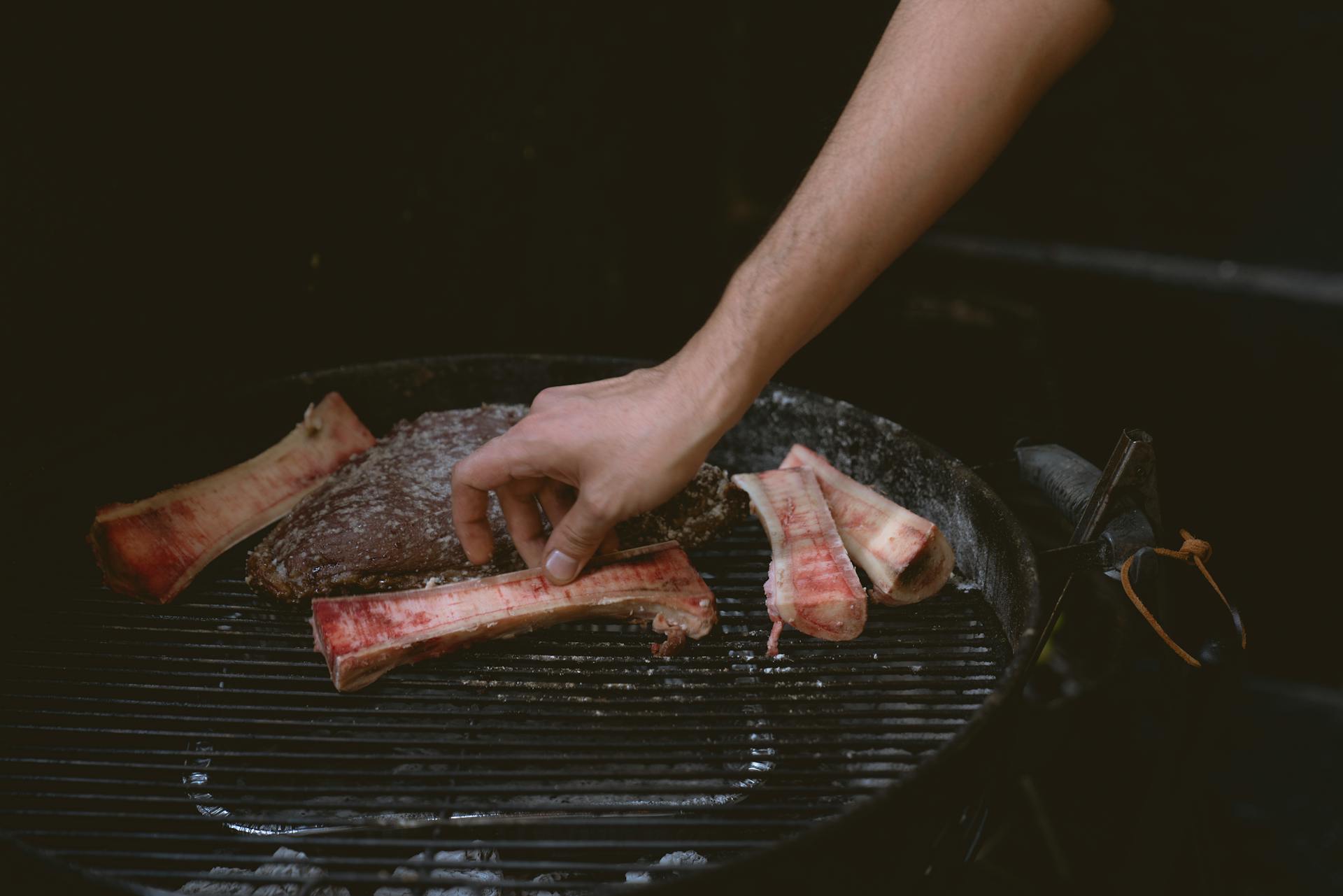
Proper disposal of rib or full bones after a cookout is crucial to prevent your dog from accessing them.
You should wrap the bones or full ribs and make sure they're safely contained in a sealed garbage container that can't be accessed by your dog.
After a full barbecue spread or an expansive serving of Buffalo chicken wings, it's essential to package up the bones and immediately dispose of them in your sealed garbage can.
Venator's family makes it a point to do this to prevent their three Labrador retrievers from getting into the bones.
An ounce of prevention really can make a big difference in your dog's health.
Emergency Situations
If your dog consumes a rib bone, act quickly to clear the area of any more access to those rib bones.
Don't try to remove any visible bone pieces on your own, as you might push it further into your dog's airway. Gastrointestinal blockage and other digestive issues may not show their symptoms right away, so keep a close eye on your dog.
Monitor your dog for any signs of discomfort and lethargy, as these symptoms usually mean that your dog's tummy is in shambles.
Choking Relief
If your dog is choking, it's essential to act fast and know the right technique.
The Heimlich Maneuver is a skill you can use to save your dog's life, but it's not something you can learn by just reading about it.
You need to watch a demonstration to do it right and be prepared to use it in an emergency.
If your dog ate a rib bone and you can't see any visible bone pieces in their mouth, don't try to remove any potential bone fragments on your own.
You might push the bone further into your dog's airway, making the situation worse.
Keep a close eye on your dog after they've eaten a rib bone, even if they seem fine, as gastrointestinal blockage and other digestive issues can be hidden symptoms.
Watch for signs of discomfort and lethargy, as these are usually indicators that your dog's tummy is in trouble.
Bone Consumption Emergency
If your dog consumes a rib bone, it's a choking hazard due to its hard and splintered nature, which can easily lodge in their airway.

Rib bones are shaped oddly and can be a real choking hazard for your dog. They should be kept out of your dog's reach at all times.
Gagging or choking, loss of appetite, vomiting, constipation, diarrhea, lethargy, inability to sit comfortably, and restlessness are all signs that your dog may have swallowed a bone and needs immediate veterinary attention.
Here are the symptoms to look out for:
- Gagging or choking
- Loss of appetite
- Vomiting
- Constipation
- Diarrhea
- Lethargy
- Inability to sit comfortably
- Restlessness
If your dog ate a rib bone, clear the area of any more access to those rib bones and gently open their mouth to remove any visible bone pieces.
Frequently Asked Questions
Are cooked pork ribs safe for dogs?
No, cooked pork ribs are not safe for dogs due to the risk of gut obstruction and toxic ingredients in the sauces. It's best to keep them out of reach to ensure your dog's safety.
Can dogs eat the meat of spare ribs?
No, dogs should not eat pork rib meat due to the risk of gut obstruction or rupture from bones and potential toxicity from sauces
Can I give my dog BBQ beef ribs?
No, it's not safe to give your dog BBQ beef ribs due to the risk of foreign body obstructions and potential surgery. Cooked bones, like those found in BBQ ribs, are particularly hazardous for dogs
Sources
- https://www.care.com/c/can-dogs-eat-rib-bones-why-these-bones-are-d/
- https://blog.petloverscentre.com/can-dogs-eat-rib-bones/
- https://www.petful.com/food/can-dogs-eat-rib-bones/
- https://www.hepper.com/can-dogs-eat-rib-bones-and-pork-bones/
- https://caninecarecentral.com/dog-care/my-dog-ate-rib-bones-and-is-throwing-up/
Featured Images: pexels.com
